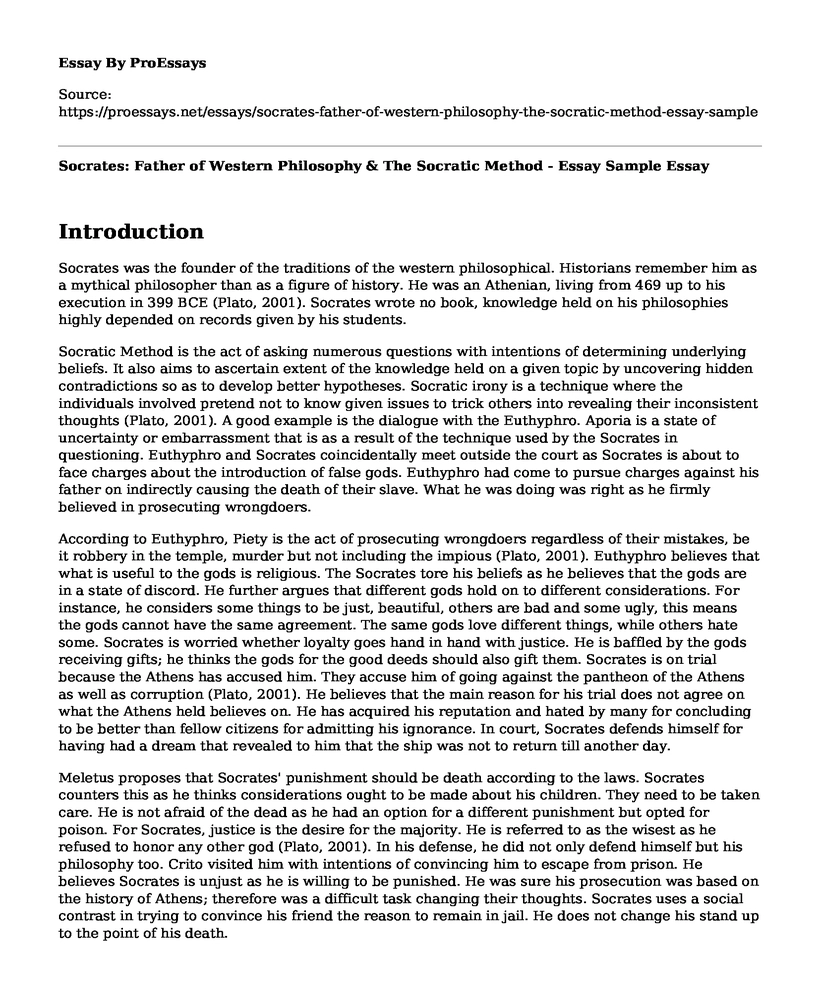Introduction
Socrates was the founder of the traditions of the western philosophical. Historians remember him as a mythical philosopher than as a figure of history. He was an Athenian, living from 469 up to his execution in 399 BCE (Plato, 2001). Socrates wrote no book, knowledge held on his philosophies highly depended on records given by his students.
Socratic Method is the act of asking numerous questions with intentions of determining underlying beliefs. It also aims to ascertain extent of the knowledge held on a given topic by uncovering hidden contradictions so as to develop better hypotheses. Socratic irony is a technique where the individuals involved pretend not to know given issues to trick others into revealing their inconsistent thoughts (Plato, 2001). A good example is the dialogue with the Euthyphro. Aporia is a state of uncertainty or embarrassment that is as a result of the technique used by the Socrates in questioning. Euthyphro and Socrates coincidentally meet outside the court as Socrates is about to face charges about the introduction of false gods. Euthyphro had come to pursue charges against his father on indirectly causing the death of their slave. What he was doing was right as he firmly believed in prosecuting wrongdoers.
According to Euthyphro, Piety is the act of prosecuting wrongdoers regardless of their mistakes, be it robbery in the temple, murder but not including the impious (Plato, 2001). Euthyphro believes that what is useful to the gods is religious. The Socrates tore his beliefs as he believes that the gods are in a state of discord. He further argues that different gods hold on to different considerations. For instance, he considers some things to be just, beautiful, others are bad and some ugly, this means the gods cannot have the same agreement. The same gods love different things, while others hate some. Socrates is worried whether loyalty goes hand in hand with justice. He is baffled by the gods receiving gifts; he thinks the gods for the good deeds should also gift them. Socrates is on trial because the Athens has accused him. They accuse him of going against the pantheon of the Athens as well as corruption (Plato, 2001). He believes that the main reason for his trial does not agree on what the Athens held believes on. He has acquired his reputation and hated by many for concluding to be better than fellow citizens for admitting his ignorance. In court, Socrates defends himself for having had a dream that revealed to him that the ship was not to return till another day.
Meletus proposes that Socrates' punishment should be death according to the laws. Socrates counters this as he thinks considerations ought to be made about his children. They need to be taken care. He is not afraid of the dead as he had an option for a different punishment but opted for poison. For Socrates, justice is the desire for the majority. He is referred to as the wisest as he refused to honor any other god (Plato, 2001). In his defense, he did not only defend himself but his philosophy too. Crito visited him with intentions of convincing him to escape from prison. He believes Socrates is unjust as he is willing to be punished. He was sure his prosecution was based on the history of Athens; therefore was a difficult task changing their thoughts. Socrates uses a social contrast in trying to convince his friend the reason to remain in jail. He does not change his stand up to the point of his death.
Conclusion
In conclusion, Socrates was tried and charged with a crime of going against Athenian gods and corrupting the youths of Athens. For him, seeking knowledge and being ignorant was better than claiming to be knowledgeable while you are not.
Reference
Plato. (2001). The Trial and Death of Socrates. New York: Chartwell Books.
Cite this page
Socrates: Father of Western Philosophy & The Socratic Method - Essay Sample. (2023, Feb 13). Retrieved from https://proessays.net/essays/socrates-father-of-western-philosophy-the-socratic-method-essay-sample
If you are the original author of this essay and no longer wish to have it published on the ProEssays website, please click below to request its removal:
- Ethical Choices in the Design and Administration of Executive Compensation Programs
- Good Will as the Most Morally Valuable Thing Essay
- Free Will, Determinism, and Compatibilism Essay Example
- Essay Example on Plato's Theory of Forms: Exploring the Good Life
- Research Paper on Achieve the American Dream: The Value of College Degrees
- Essay Example on The American Dream: Success Through Hard Work and Sacrifice
- Free Essay Example on Later Life Issues







